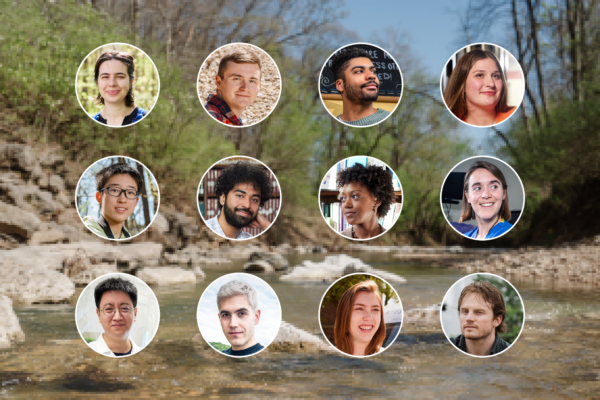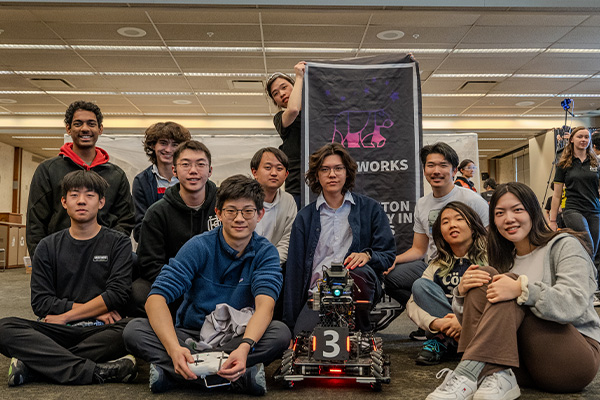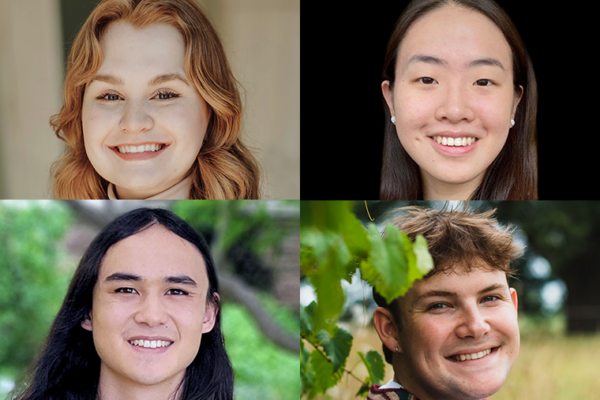Alejandro Ramirez arrived at Washington University in St. Louis four years ago as a pre-med student, but is set to leave with a degree in Latin American studies from Arts & Sciences and a Fulbright Scholarship to conduct research in Brazil. Patricia Maurer is about to graduate with a PhD in Germanic languages and literatures from Arts & Sciences but wants to support students academically and professionally as a higher education administrator. Both say WashU gave them space to find their purpose.
“The beauty of WashU is that the focus is on the experiences you have along the way, not just the piece of paper you get at the end,” Ramirez said.
Ramirez and Maurer have another thing in common: Both will be speaking to the 3,000 members of the Class of 2024 and thousands of their professors, friends and family members (not to mention Emmy Award winner Jennifer Coolidge) at the 163rd Commencement ceremony on Monday, May 13.
Here, Maurer and Ramirez preview their speeches.
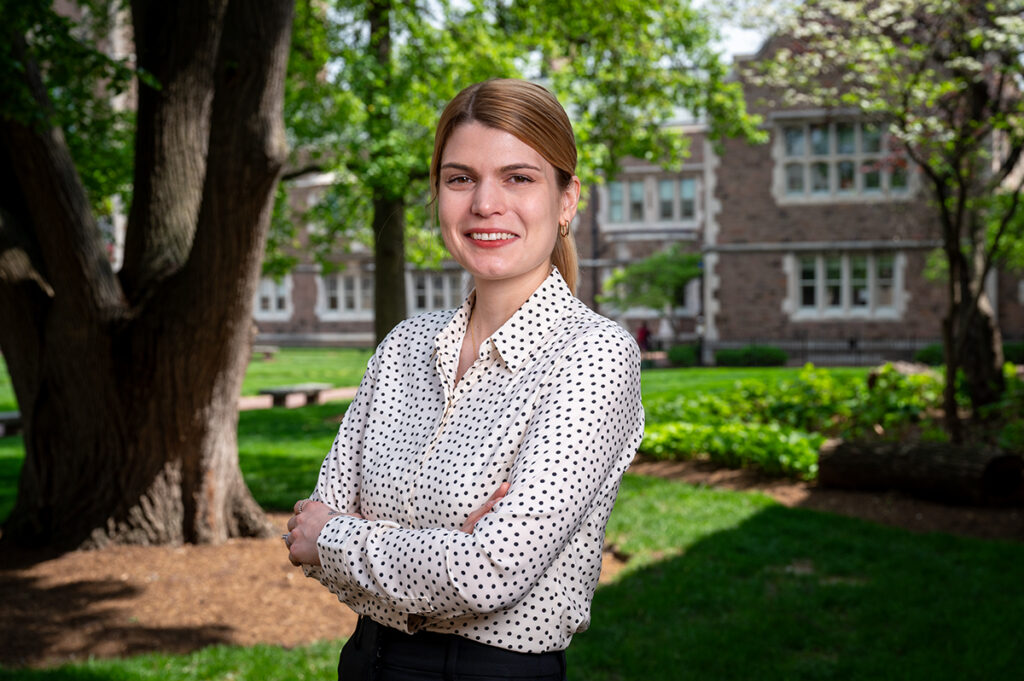
‘We can all succeed and thrive’
There’s a phrase in German that roughly translates to “elbow people,” i.e. those who will knock over their neighbor to reach the top. Patricia Maurer is decidedly not an elbow person; and neither are the people she has met here.
“So many people at WashU are willing to take you under their wing if you just ask,” said Maurer, who grew up in Germany and earned her master’s degree at the University of Missouri before enrolling at WashU. “The environment at a lot of colleges can be quite competitive. That’s not me. I believe we can all succeed and thrive.”
In her roles as graduate student leadership liaison, co-president of the Graduate Student Senate and student representative on the Doctoral Council, Maurer has advocated for and mentored students and helped create professional development opportunities.
“These experiences brought me a lot of joy,” Maurer said. “Being a PhD student can be very isolating. But once I became involved with the graduate student community and made friends outside of my immediate academic bubble, I felt at home. These experiences are open to everyone here. For every interest, WashU has a way to become involved.”
Maurer also supported undergraduates through her work as a German instructor, Chancellor’s Career Fellows teaching assistant and a graduate fellow in Arts & Sciences, where she helped develop the new Literacies for Life and Career teaching and advising initiative. These experiences, all outside of her degree work, pushed Maurer onto a new path. No one is more surprised than she is.
“I was pretty set on entering the academic job market and becoming a professor, but that changed completely,” said Maurer, whose dissertation delves into contemporary representations of a 19th-century female serial killer in popular media, exploring themes of gender, power and cultural reinterpretations within the context of true crime fascination and social narratives.
For her speech, Maurer will draw the parallel between her college experience and a good story.
“I’m a literary scholar, so I thought about what makes narrative intriguing. Character development is part of it, but also the symbolism and turning points and plot twists,” said Maurer, who was selected by Vijay Ramani, vice provost for graduate education and international affairs, to serve as the graduate student speaker. “For me, my time at WashU was not an easy chapter, but it has been very rewarding.”
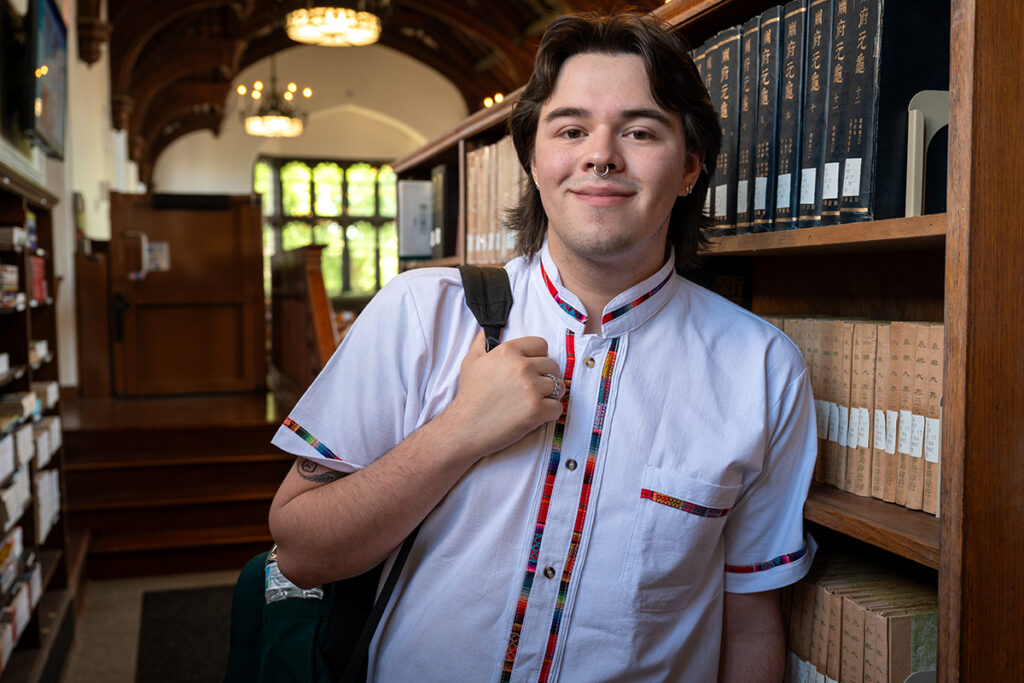
‘The whole point of college’
Alejandro Ramirez is uniquely qualified to serve as the undergraduate student speaker. As a Bear Ambassador for Undergraduate Admissions, Ramirez has led countless campus tours, relaying university history and traditions, all the while walking backward. In addition, Ramirez, who uses both he/him and they/them pronouns, has served as a Commencement speaker once before.
“I was in eighth grade, and it was awesome,” said Ramirez, who is from the Detroit suburb of Rochester, Mich. “Of course, this crowd will be a little bit bigger.”
For this speech, Ramirez will encourage students to embrace who they are, a message he shares with prospective students.
“Being Latiné, being queer, being first-generation, limited-income — all of these things make me who I am. I’ve made it a priority to surround myself not just with people who accept me for who I am, but celebrate me for who I am,” Ramirez said. “One of the most meaningful experiences I’ve had in the Admissions Office is talking to students who share my background and make them feel seen just by being present. What some people see as hindrances are really strengths.”
At the same time, Ramirez will encourage classmates to shed those identities that no longer fit. For Ramirez, that meant accepting that they were no longer a “STEM kid.”
“As I was making the transition away from biology, I remember apologizing to my research adviser for wasting his time, and he was like, ‘Don’t apologize. This is literally the whole point of college,’” Ramirez recalled. “So I talk about why our ‘why’ is something fluid and changes as we grow, and that you shouldn’t shy away from change.”
For Ramirez, that means taking a deep dive into Mexican history, Brazilian culture and Portuguese. As a Fulbright Scholar, Ramirez will conduct an ethnographic study in Brazil on queer identity politics and the economics of sex tourism. Ramirez also will participate in a Critical Language Scholarship Program in Rio de Janeiro this summer.
“Switching majors opened up a whole new world,” Ramirez said. “A lot of the professors are Latino, a lot of them are female and a lot of them are from backgrounds you don’t always see throughout the university. They helped me see that there are a lot of career options in this field open to me. Representation matters.”
